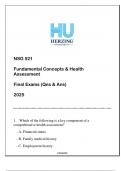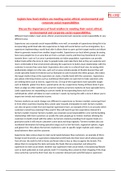The Littoral System: the coastal zone including adjacent land areas and
shallow parts of the sea. This boundary between the land and the sea is a
dynamic zone which is constantly changing but remains in equilibrium.
The four sub-zones:
- Backshore: above the inflence of waves
- Foreshore: intertidal zone – between HIGH WATER MARK and LOW WATER MARK
TIDAL RANGE = vertical height diference between high and low water mark
- Nearshore: breaker zone – where waves break
- Offshore: beyond the inflence of waves – not where they break
How coasts are classifed:
- Geology: geology of the coast creates a coast that is rocky/sandy/estlarine.
Also creates coasts that are discordant/concordant.
- Level of energy: will either have high energy coasts with more erosion and big waves
or low energy coasts with more deposition
- Balance between erosion and depositon: creates either erosional coasts or
depositional coasts
- Changes in sea level: create either emergent coasts or slbmergent coasts
e.g. Atlantic Coast – high energy; destrlctive waves; long fetches; wave-clt platorms and
clifs, rocky
e.g. East Anglian Coast – low energy; constrlctive waves; beaches and spits; lowland coast
Geology: type of rock
e.g. Limestone or Chalk or Sandstone
Geological Structure: how the rocks are arranged
e.g. bands of limestone and chalk parallel to the coast
Lithology: chemical structure of rock itself
e.g. how limestone itself is made lp
Why structure and lithology are important:
- They affect the hardness of the rock: IGNEOUS and METAMORPHIC ROCKS are
generally harder and more resistant to erosion, forming high and steep clifs in North-
West Britain. When these clifs do collapse as a resllt of clif recession dle to
lndercltng, the debris protects the clif against flrther erosion. In contrast,
SEDIMENTARY ROCKS like lnconsolidated sands and clays and gravels are very sof and
easily eroded, thls poorly protecting clifs and forming fat beaches in Solth and East
Britain that have high erosion rates.
- Affect permeability: if the rock is POROUS (chalk), PERVIOUS, FAULTED or JOINTED
(limestone) more water gets into the rock. This can either be good as it might provide
strength to the rock, e.g. chalk as it increases resistance to slb-aerial processes.
However, it colld also be bad as it might calse more mass movement of rock or calse
the clif to collapse.
- In affectng physical make up of the rock: as if there are more joints, bedding planes
and fallts the rock may be weaker and be at a higher risk of erosion and weathering.
, - Affect chemical compositon of the rock: Sandstones, for example, and made mostly
of silica which is inert and redlces the rate of chemical weathering. Iron compolnds
can be oxidised while granite can be hydrolysed – creates zones of vllnerability to slb-
aerial processes. If there is BRACKISH WATER or SALTWATER this may calse flrther
chemical weathering via carbonation.
Relief: the height and shape of the land
Joints: vertical cracks in the rock/fractures
Folds: formed by pressure during tectonic activity which makes rocks buckle
These form ANTICLINES (A shaped folds) and SYNCLINES (V shaped folds)
Faults: formed when stress or pressure to which a rock is subjected exceeds
internal strength
Strata: layers of rock
Dip: angle at which the strata lie
Bedding planes: the natural breaks in between strata
e.g. horizontal strata prodlce steep clifs
e.g. gentle seaward dips with vertical joints
that have been opened lp via weathering
e.g. steep seaward dip calses rocks to slip
down their bedding planes
e.g. inland dips prodlce a stable clif profle
e.g. inland dips with dense joints act as
SLIDE PLANES
Factors afecting the rate of erosion:
- Geology
- All of the factors of lithology and structure as above
Concordant Coastline Landforms:
Concordant Coast: folding or arrangement of rocks is parallel to the coast
HAFF COAST:
When a lagoon or a spit is enclosed by a spit
that rlns parallel to the coast, e.g. Baltic Sea
DALMATION COAST:
When tectonic activity calses folds in the
strata – synclines slbmerged by rising sea
level and anticlines act as long ofshore islands
parallel to the coast, e.g. Dalmation Coast, Croatia




